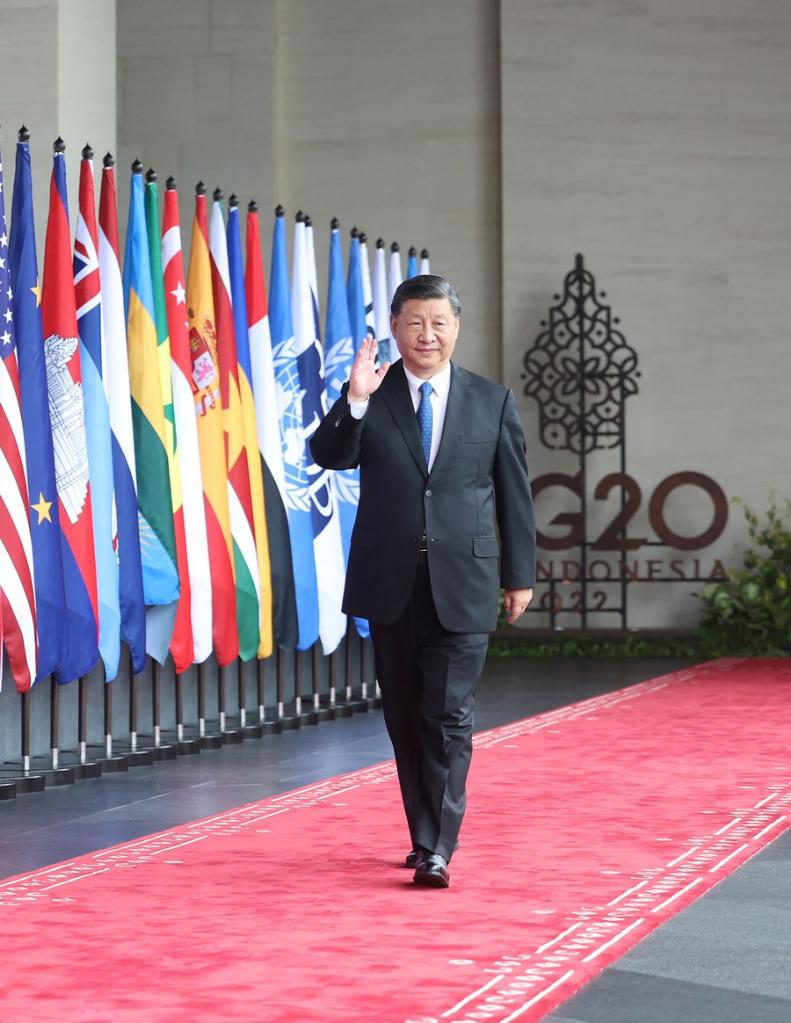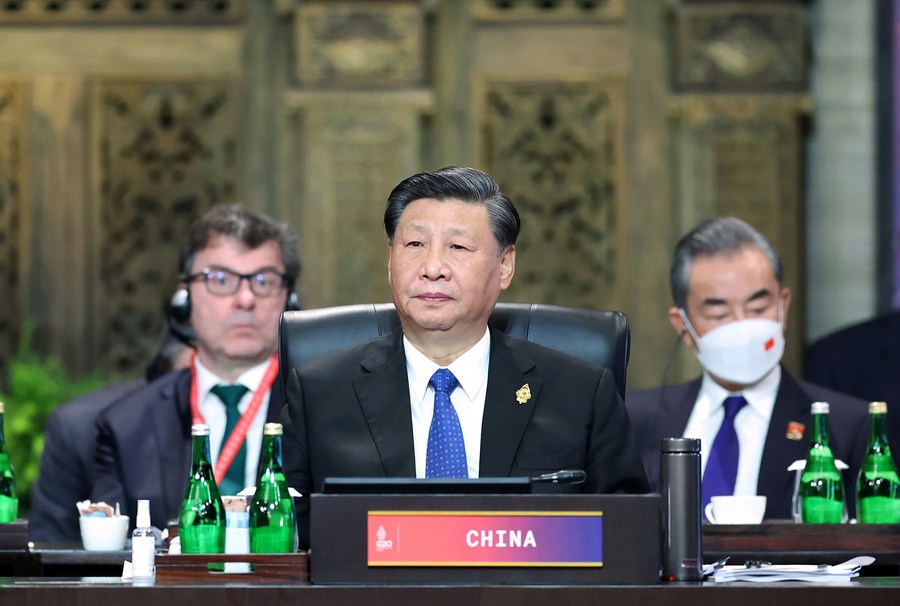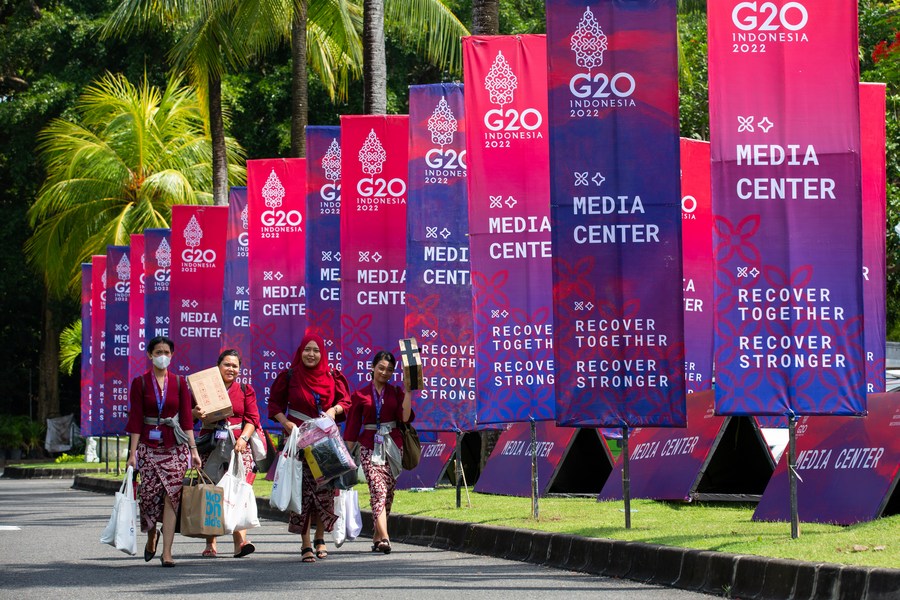

As the world is going through unprecedented difficulties unseen in many decades, Chinese President Xi Jinping, in his speech at the first session of the 17th Group of 20 summit, called on countries, world's major economies in particular, to stand with each other in the face of risks and challenges, join hands together, and elevate win-win cooperation to a new height.
The Chinese leader once again called for more global efforts to support and assist developing countries and ensure that the benefits be shared by all across the globe, saying, "Development is real only when all countries develop together."
Noting the root cause of the ongoing crises is not production or demand, but interrupted supply chains and international cooperation, Xi suggested that the global community enhance cooperation on market supervision and regulation, build partnerships on commodities, develop an open, stable and sustainable commodities market, and work together to unclog supply chains and stabilize market prices.
BALI, Indonesia, Nov. 15 (Xinhua) -- Chinese President Xi Jinping on Tuesday called for collective actions and close cooperation to make global development more inclusive, beneficial to all, and more resilient, and stressed the importance of joint efforts to unclog industrial and supply chains and stabilize market prices to tackle food and energy crises.
He made the appeal when delivering a speech at the first session of the 17th Group of 20 (G20) summit here, and also when meeting with world leaders.
Xi's remarks came at a critical moment when the world economy is facing a bunch of mixed and acute challenges including the increasing risk of deep recession, growing attempts to form bloc politics and stoke confrontation, wider gap between the rich and the poor, as well as the worsening food and security crises.
As experts and observers said, as global development is threatened by those formidable challenges, Xi's speech, which has elaborated on China's answer to those problems and showed its commitment to a better future, will help build up stronger global consensus, advance global cooperation, bolster world economic growth and achieve common prosperity.

Chinese President Xi Jinping walks to the venue of the 17th summit of the Group of 20 (G20) in Bali, Indonesia, Nov. 15, 2022. Xi delivered a speech titled "Working Together to Meet the Challenges of Our Times and Build a Better Future" at the summit. The G20 summit kicked off here on Tuesday. (Xinhua/Ju Peng)
SOLIDARITY, COOPERATION THE ONLY WAY OUT
The world is going through unprecedented difficulties unseen in many decades, and the rising protectionism and isolationism, the resurgence of the outdated Cold-War mentality as well as arbitrary sanctions have seriously disrupted international cooperation to shore up recovery.
To address this situation, the Chinese president, in his speech at the G20 summit, called on countries, world's major economies in particular, to stand with each other in the face of risks and challenges, join hands together, and elevate win-win cooperation to a new height.
"I always believe that the G20 should stay committed to its founding purpose of unity and cooperation, carry forward the spirit of solidarity, and uphold the principle of consensus," he said, noting that "only solidarity and common development is the right choice to make."
Selcuk Colakoglu, director of the Turkish Center of Asia Pacific Studies, agreed with Xi's proposal, saying "a coordinated global approach to those problems of the world is a must" because there is no single national solution to handle the challenges.
Boosting partnership and cooperation is also a major topic during a series of bilateral meetings between Xi and leaders of other countries on Tuesday. When meeting French President Emmanuel Macron, Xi said China stands ready to work with France to step up communication and coordination on issues including climate response and biodiversity conservation, jointly uphold true multilateralism, tackle global challenges such as food and energy security, and find solutions to the thorny issues confronting sustainable development.
When holding talks with Senegalese President Macky Sall, Xi said China will continue to enhance solidarity and cooperation with Senegal and other African countries to jointly build a China-Africa community with a shared future in the new era.
In his meeting with South Korean President Yoon Suk-yeol, Xi stressed that China is ready to work with South Korea to promote cultural exchanges and cooperation, scale up communication and coordination at the G20 and other fora, jointly practice true multilateralism and safeguard overall peace and stability in the region.
As Xi noted, to deepen cooperation among all countries is the only viable way to get through the difficult times, said Mohammed Saqib, Indian economist and secretary-general of the India-China Economic and Cultural Council.
"China has set an example of collaboration and commitment with other countries amid the COVID-19 pandemic. I think this is when governments should follow suit and come forward for holistically enhanced all-around cooperation to pull out of this chaos," the economist added.

Chinese President Xi Jinping delivers a speech titled "Working Together to Meet the Challenges of Our Times and Build a Better Future" at the 17th summit of the Group of 20 (G20) in Bali, Indonesia, Nov. 15, 2022. The G20 summit kicked off here on Tuesday. (Xinhua/Ju Peng)
COMMON DEVELOPMENT FOR ALL
Just as he had stated on many occasions previously, the Chinese leader once again called for more global efforts to support and assist developing countries and ensure that the benefits be shared by all across the globe.
"Development is real only when all countries develop together," Xi said in the speech. "Prosperity and stability cannot be possible in a world where the rich become richer while the poor are made poorer."
He also urged frontrunners in development to sincerely help others develop, and provide more global public goods. "All major countries should perform their due responsibilities, and do their best for the cause of global development," he added.
Xi's words is a vivid reflection of China's long-term commitment to common development. For decades, the country has always lent a supportive hand to developing countries, especially those in Asia, Africa and Latin America through investment, infrastructure, skills training and education.
During the meeting with South African President Cyril Ramaphosa, Xi noted that China's development will bring more opportunities to South Africa and other countries.
In the views of Bambang Suryono, chairman of the Indonesian think tank Asia Innovation Study Center, the world community, in the face of increasing difficulties and challenges, has higher expectations than before on the G20's role in improving global governance.
Suryono urged advanced economies to fulfill their pledges with practical actions, fully accommodate the difficulties and concerns of developing and less developed countries, and provide support in capital, technology and capacity building.
Victoria Panova, vice rector of Russia's National Research University-Higher School of Economics, said a huge number of people on Earth are concerned about their livelihoods such as food, house and health care, as these are basic necessities for human life.
Therefore, comprehensive work on these topics is very important, because "all countries have equal rights and the opportunity to realize development based on mutual interests," she noted.

This photo taken on Nov. 13, 2022 shows posters for the upcoming 17th Group of 20 (G20) Summit in Bali, Indonesia. (Xinhua/Wang Yiliang)
JOINT ACTIONS FOR FOOD, ENERGY SECURITY
The global food and energy crises, which have caused damaging impact to many countries and regions, is the most pressing challenge in global development. According to the World Food Programme, there is an unprecedented 345 million people whose lives and livelihoods are in immediate danger from acute food insecurity.
In this context, Xi, in his speech, pointed out that the root cause of the ongoing crises is not production or demand, but interrupted supply chains and international cooperation.
He suggested that the global community enhance cooperation on market supervision and regulation, build partnerships on commodities, develop an open, stable and sustainable commodities market, and work together to unclog supply chains and stabilize market prices. He also voiced resolute opposition to the attempt to politicize food and energy issues or use them as tools and weapons.
Xi's proposal is widely hailed by foreign experts and observers. Alessia Amighini, co-head of Asia Center and senior associate research fellow at the Italian Institute for International Political Studies, said Xi's proposal offers the G20 a very clear position.
Suryono, the Indonesian expert, said in order to safeguard global food and energy security, countries should bridge difference and solve problems through dialogue and coordination, instead of using them as a target of sanctions and as a bargaining chip in diplomacy.
In his meeting with Dutch Prime Minister Mark Rutte, Xi underscored that the attempt to politicize economic and trade issues must be rejected, and stability of global industrial and supply chains should be maintained.
Ibrahim Alluhayb, a professor at King Saud University in Saudi Arabia, said Xi's remarks about opposing the politicization and weaponization of food and energy issues have reflected the common voice of a large majority of countries across the world.
Both importers and exporters hope to regard food and energy as commodities, rather than a tool used in international political struggles, the professor added.
点击右上角![]() 微信好友
微信好友
 朋友圈
朋友圈

请使用浏览器分享功能进行分享
